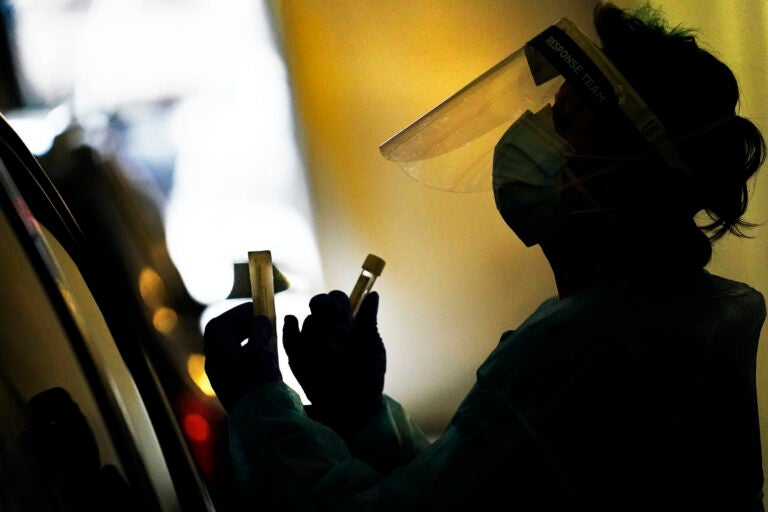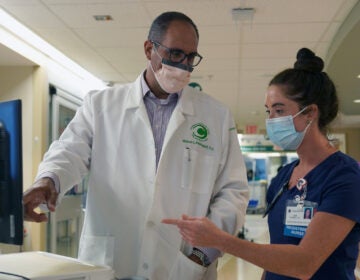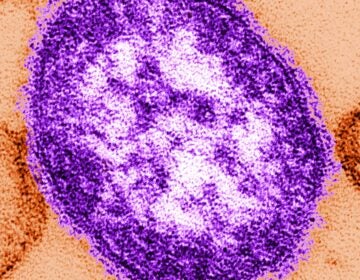More contagious COVID strain detected in Philly-Bucks County resident
The highly transmissible B.1.1.7 variant of the SARS-Cov-2 virus was found in a woman in her 50s. She is now recovering.

In this file photo, a health care worker wears personal protective equipment as she speaks with a patient at a mobile testing location for COVID-19. (AP Photo/Robert F. Bukaty, File)
Ask us about COVID-19: What questions do you have about the current surge?
Scientists have identified the highly transmissible B.1.1.7 variant of the SARS-Cov-2 virus in a woman in her 50s who lives in Philadelphia and Bucks County. The newly discovered strain was originally detected in the United Kingdom last September.
Frederic Bushman, chair of microbiology at the Perelman School of Medicine at the University of Pennsylvania, analyzed the sample sent to his lab following an investigation by the health departments in both counties where the woman resides.
Bushman’s lab has the capacity to perform sophisticated viral genetic sequencing, which is how the variant was originally detected in the U.K. Bushman’s team found that the sample from the Southeastern Pennsylvania woman contained 22/23 of the mutations characteristic of the new strain, including all of the changes to the Spike protein. It’s those changes that scientists have predicted makes the variant more infectious.
“It’s unsettling to find the U.K. variant in Southeastern PA, and further it’s unsettling that it’s an indication that the virus is probably evolving to spread more efficiently between humans,” said Bushman. “But it just emphasizes that we should do the things we know work — wear a mask, social distancing, wash your hands, stay out of crowds, get the vaccine.”
The patient became infected after having contact with someone else who tested positive and had recently returned from travel in the U.K. She began showing symptoms the last week of December, and was briefly hospitalized, health officials from the two counties said in a joint statement Friday. She is currently recovering.
B.1.1.7 is one of three more contagious strains of the coronavirus that have developed since the pandemic began — the other two were detected originally in South Africa and Brazil.
So far 76 cases of B.1.1.7 have been detected in the United States, with the most in California and Florida. It’s been found in 46 countries.
It is not unusual for a virus to mutate — the question is whether the changes in the virus’s Spike protein, which scientists theorize will make it easier to bind to cells, will affect the efficacy of the vaccines currently available. The two authorized mRNA vaccines for COVID-19 are both designed to give the body instructions for how to build its own Spike protein, prompting a lasting immune response.
So far, evidence suggests the Pfizer/BioNtech vaccine will still defend against the B.1.1.7 variant in its current stage. Further mutation may complicate that, and the other strains have not yet been investigated.
While the new strain is not inherently more deadly, if it indeed causes more infections, some of which become serious, it could ultimately result in more death as well.

Get daily updates from WHYY News!
WHYY is your source for fact-based, in-depth journalism and information. As a nonprofit organization, we rely on financial support from readers like you. Please give today.



![CoronavirusPandemic_1024x512[1]](https://whyy.org/wp-content/uploads/2020/03/CoronavirusPandemic_1024x5121-300x150.jpg)



